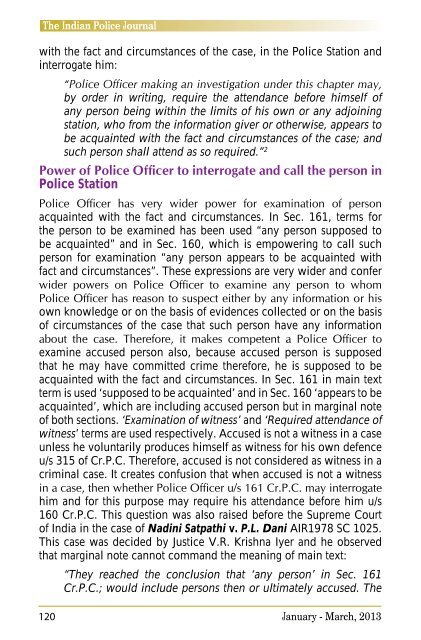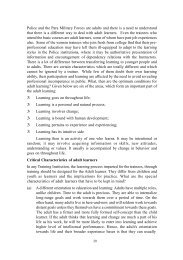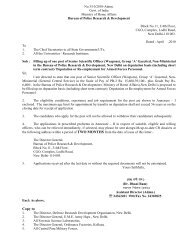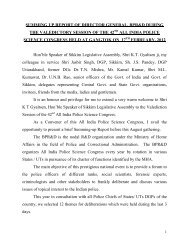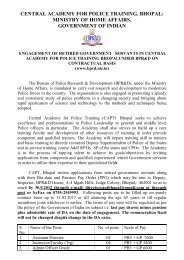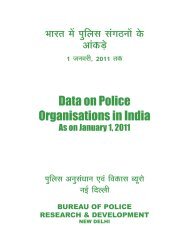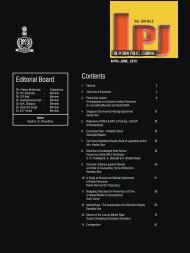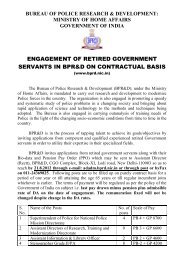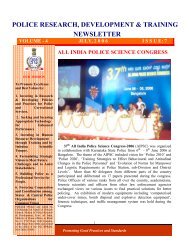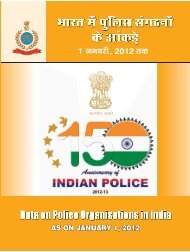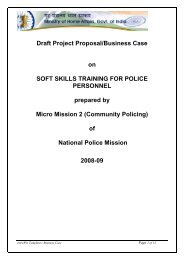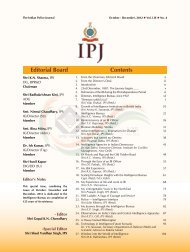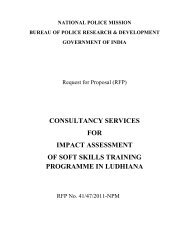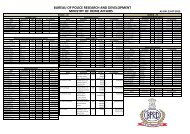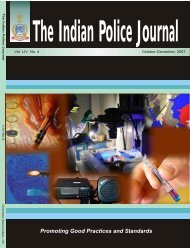by Police - Bureau of Police Research and Development
by Police - Bureau of Police Research and Development
by Police - Bureau of Police Research and Development
You also want an ePaper? Increase the reach of your titles
YUMPU automatically turns print PDFs into web optimized ePapers that Google loves.
The Indian <strong>Police</strong> Journalwith the fact <strong>and</strong> circumstances <strong>of</strong> the case, in the <strong>Police</strong> Station <strong>and</strong>interrogate him:<strong>by</strong> order in writing, require the attendance before himself <strong>of</strong>any person being within the limits <strong>of</strong> his own or any adjoiningstation, who from the information giver or otherwise, appears tobe acquainted with the fact <strong>and</strong> circumstances <strong>of</strong> the case; <strong>and</strong>such person shall attend as so required.” 2<strong>Police</strong> Station acquainted with the fact <strong>and</strong> circumstances. In Sec. 161, terms forthe person to be examined has been used “any person supposed tobe acquainted” <strong>and</strong> in Sec. 160, which is empowering to call suchperson for examination “any person appears to be acquainted withfact <strong>and</strong> circumstances”. These expressions are very wider <strong>and</strong> confer own knowledge or on the basis <strong>of</strong> evidences collected or on the basis<strong>of</strong> circumstances <strong>of</strong> the case that such person have any information examine accused person also, because accused person is supposedthat he may have committed crime therefore, he is supposed to beacquainted with the fact <strong>and</strong> circumstances. In Sec. 161 in main textterm is used ‘supposed to be acquainted’ <strong>and</strong> in Sec. 160 ‘appears to beacquainted’, which are including accused person but in marginal note<strong>of</strong> both sections. ‘Examination <strong>of</strong> witness’ <strong>and</strong> ‘Required attendance <strong>of</strong>witness’ terms are used respectively. Accused is not a witness in a caseunless he voluntarily produces himself as witness for his own defenceu/s 315 <strong>of</strong> Cr.P.C. Therefore, accused is not considered as witness in acriminal case. It creates confusion that when accused is not a witnesshim <strong>and</strong> for this purpose may require his attendance before him u/s160 Cr.P.C. This question was also raised before the Supreme Court<strong>of</strong> India in the case <strong>of</strong> Nadini Satpathi v. P.L. Dani AIR1978 SC 1025.This case was decided <strong>by</strong> Justice V.R. Krishna Iyer <strong>and</strong> he observedthat marginal note cannot comm<strong>and</strong> the meaning <strong>of</strong> main text:“They reached the conclusion that ‘any person’ in Sec. 161Cr.P.C.; would include persons then or ultimately accused. The120 January - March, 2013


